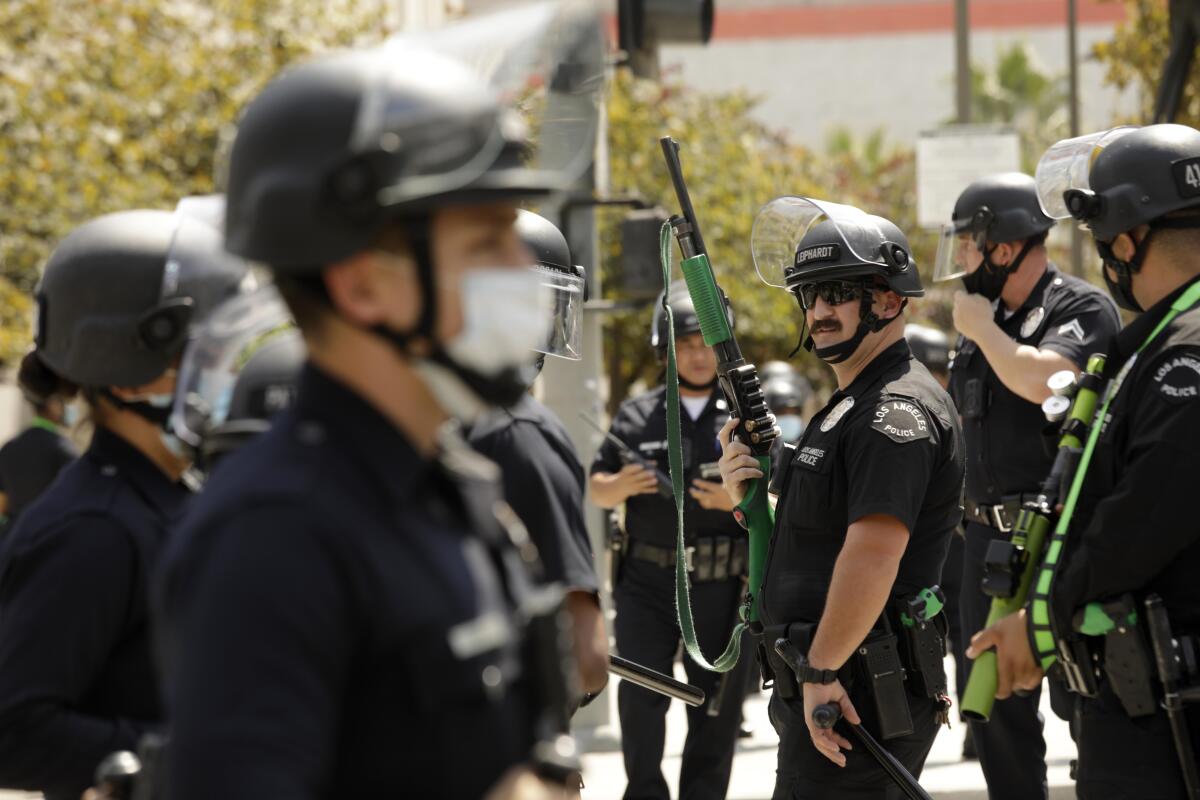Thousands of LAPD employees plan to seek exemptions to COVID-19 vaccine mandate

Thousands of Los Angeles Police Department employees plan to seek exemptions to rules requiring city workers to get vaccinated against COVID-19, according to figures released Tuesday by city officials.
More than 2,600 LAPD employees have indicated that they plan to pursue religious exemptions, while more than 360 plan to seek medical ones.
That could amount to roughly a quarter of the LAPD’s workforce planning to seek an exemption, based on data in a memo sent by Wendy Macy, who heads the personnel department. Among city employees as a whole, fewer than 11% have indicated that they will seek an exemption.
LAPD personnel are heavily represented among those who may seek religious exemptions; they make up less than 22% of city employees but account for more than 50% of those planning to seek an exemption on the basis of religion.
Under the ordinance passed last month by the City Council, city employees must get vaccinated against COVID-19 by Oct. 5 unless they are granted a religious or medical exemption; those who receive exemptions will be subject to regular testing for the coronavirus. The vaccination requirements become a condition of city employment on Oct. 20.
City officials pushed back a deadline last week for employees to seek an exemption to the vaccination requirement, instead giving workers until the end of Monday to indicate that they plan to pursue an exemption. Across all city departments, more than 6,200 employees did so.
L.A. officials said they are reviewing the exemption data and noted that some employees may have turned in multiple forms or said they were planning to seek both religious and medical exemptions, inflating the numbers. Additionally, workers could opt to get vaccinated after telling the city they plan to ask for an exemption.
Roughly half of city employees reported that they were at least partially vaccinated against COVID-19. Less than 10% of city employees have reported that they are unvaccinated, but a much higher share — roughly 40% — have not provided any information about their vaccination status, according to the data from the personnel department.
“Every city employee is required to provide their vaccine status, and the deadline has passed. Anyone who hasn’t given us that information must do it now,” Mayor Eric Garcetti said in a statement Tuesday.
However, a spokesman for the Department of Water and Power said its employees have until the end of September to report whether they are vaccinated. The department accounts for more than a third of L.A. employees who haven’t responded.
In his statement, Garcetti added, “This policy allows for medical and religious exemptions to protect certain workers’ health and constitutional rights, but let me be absolutely clear: We will not tolerate the abuse of these exemptions by those who simply don’t want to get vaccinated.”
“I’ve said before that city employees need to step up and do what’s right by getting vaccinated,” City Council President Nury Martinez said in a statement Tuesday. “Personnel staff will consider these exemption requests on a case-by-case basis and go from there.”
Roughly 54% of LAPD employees have had at least one dose of a COVID-19 vaccine, according to Chief Michel Moore. That rate lags the general public, raising concerns about the health risk posed to the people LAPD employees interact with on streets and in confined spaces such as jails and courthouses.
Activists have routinely recorded police officers without masks in public spaces, despite a department directive to wear them “whenever in public or in the workplace.” Ten LAPD employees have died of COVID-19, and thousands have been infected. Moore told the Police Commission on Tuesday that there had been 66 new infections in the department in the last two weeks, with more than 140 employees at home recovering and four hospitalized.
In recent days, a group of LAPD employees filed a federal lawsuit challenging the vaccination mandate, arguing that it violates their constitutional rights to privacy and due process. Among those who sued are employees “who could not assert a medical or religious exemption,” as well as those who contend they have natural antibodies from contracting the coronavirus, according to the legal complaint, filed Saturday in U.S. District Court in Los Angeles.
On Monday, L.A. City Atty. Mike Feuer called the lawsuit “much more political statement than it is sound legal argument” and said he was confident it would fail to overturn the city requirement.
“It cannot be the case that the health of anyone’s child, anyone’s grandma, anybody in our city could be put at risk because they come into contact with a first responder who hasn’t been vaccinated,” Feuer said.
Firefighters 4 Freedom, a group opposing the vaccination mandate, has urged unvaccinated employees not to file for medical or religious exemptions, calling them “a trap.” Kevin McBride, the group’s attorney, argued in a recent letter to L.A. Fire Chief Ralph Terrazas that “the only reason to require firefighters to seek an exemption is to identify those who oppose the COVID vaccine mandate” for “potential misuse on this issue in the future.”
“The goal ... is to overturn an unconstitutional city ordinance, not to be granted a stay of execution,” Firefighters 4 Freedom wrote in an Instagram post. “Getting any type of exemption will never make this problem of government overreach go away.”
Exemptions may be easier to secure than a legal judgment overturning the mandate, however.
Lindsay F. Wiley, director of the Health Law and Policy Program at American University Washington College of Law, called religious exemptions “an incredibly tricky area” for employers implementing vaccination requirements. The 1st Amendment limits the ability of government to distinguish between recognized religions and individual belief, Wiley said, which means an employer cannot simply toss out a request because it isn’t backed by an official in a recognized sect.
Wiley said some employers have scrutinized whether a worker is stating a religious belief, rather than expressing other kinds of concerns, in pursuit of an exemption. But vaccination opponents have advised workers on how to word their exemption requests to avoid triggering such objections.
“The bottom line is, these are really easy to game,” Wiley said.
Nomi Stolzenberg, professor at USC Gould School of Law, said that employers can turn down a religious exemption if they can demonstrate that it is insincere, but “no one has actually figured out a way to test the sincerity of a person who claims they have religious objections.” As a result, employers have largely deferred to “religious exemptions on demand.”
The L.A. ordinance defines the vaccination requirement as a condition of city employment but does not spell out what happens if someone refuses to get the shots and fails to get approved for an exemption. City officials have been in talks with employee unions about how the vaccination rules affect workers.
The Los Angeles Police Protective League has argued that the city should allow weekly testing as an alternative to getting vaccinated, regardless of whether an employee has obtained a medical or religious exemption. In a written proposal, the police union argued that doing so “strikes an appropriate balance.”
That would diverge from the ordinance, which explicitly states that city workers without approved exemptions will not be able to “opt out” of vaccination by getting tested weekly, since the “goal is to have a vaccinated workforce.”
More to Read
Sign up for Essential California
The most important California stories and recommendations in your inbox every morning.
You may occasionally receive promotional content from the Los Angeles Times.












